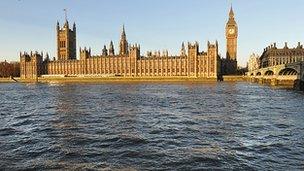Fresh defeat for government over welfare changes
- Published

Ministers say they are committed to seeing through the changes
The government has suffered a seventh defeat in the House of Lords over proposed changes to the welfare system.
Peers rejected plans to reduce the rate of some benefits given to the families of disabled children.
Ministers had wanted to reduce the amounts paid for children who do not need care at night - but say current recipients will not lose money.
But peers backed an amendment put down by crossbencher Baroness Meacher limiting the cuts by 246 votes to 230.
The government has already suffered a series of defeats in the Lords, notably on its proposed £26,000 cap on total benefits, planned changes to employment and support allowance for cancer patients and charges for single parents to access assistance from the Child Support Agency.
'Loss of income'
Ministers have insisted they will seek to reinstate the proposals when MPs reconsider changes to the Welfare Reform Bill agreed by the Lords - a process beginning on Wednesday.
Ahead of Tuesday's vote, the government said the proposed changes would help to direct more support towards the most severely disabled who do need round-the-clock care.
Under the current system, children who receive Disability Living Allowance can also receive extra money via the "disability element" of Child Tax Credit. Those with the highest needs - requiring 24-hour care and support - can get £75 a week, those who do not need care at night can get £53 a week.
Under the new Universal Credit system, introduced in the Welfare Reform Bill, the lower rate would be cut to £26.75 a week, although ministers say there will be no "cash losers" - those who currently get the benefit will not lose money.
Ministers also want to introduce a slight increase to the weekly rate for the most disabled children, raising it to £77. Critics argued the change would see many families losing as much as £1,400 a year.
A crossbench amendment tabled by Baroness Meacher calling for the lower rate to be at least two thirds of the value of the top rate was passed by 16 votes.
"One hundred thousand or so children affected by this loss of benefit are very likely to live in poverty," she told peers, adding that "a loss of some income really does matter".
Two Conservatives and seven Lib Dem peers voted against the government, joining forces with Labour members and the majority of crossbenchers to back the amendment.
- Published23 January 2012
- Published24 January 2012
- Published11 January 2012